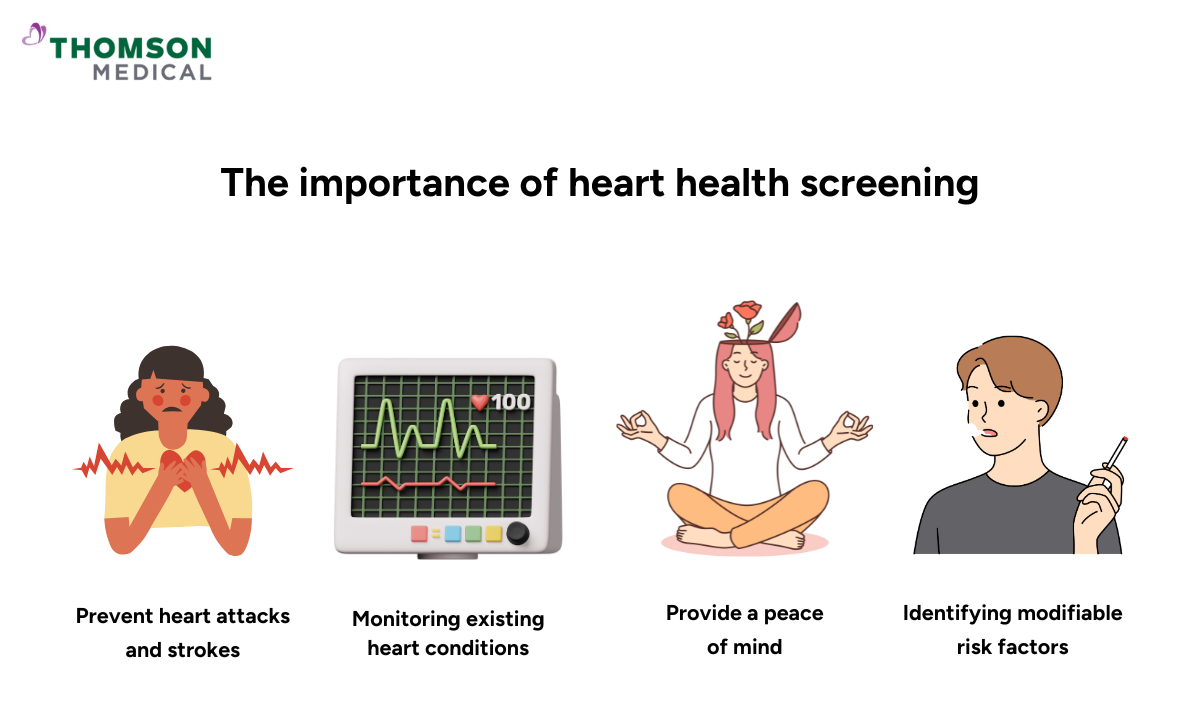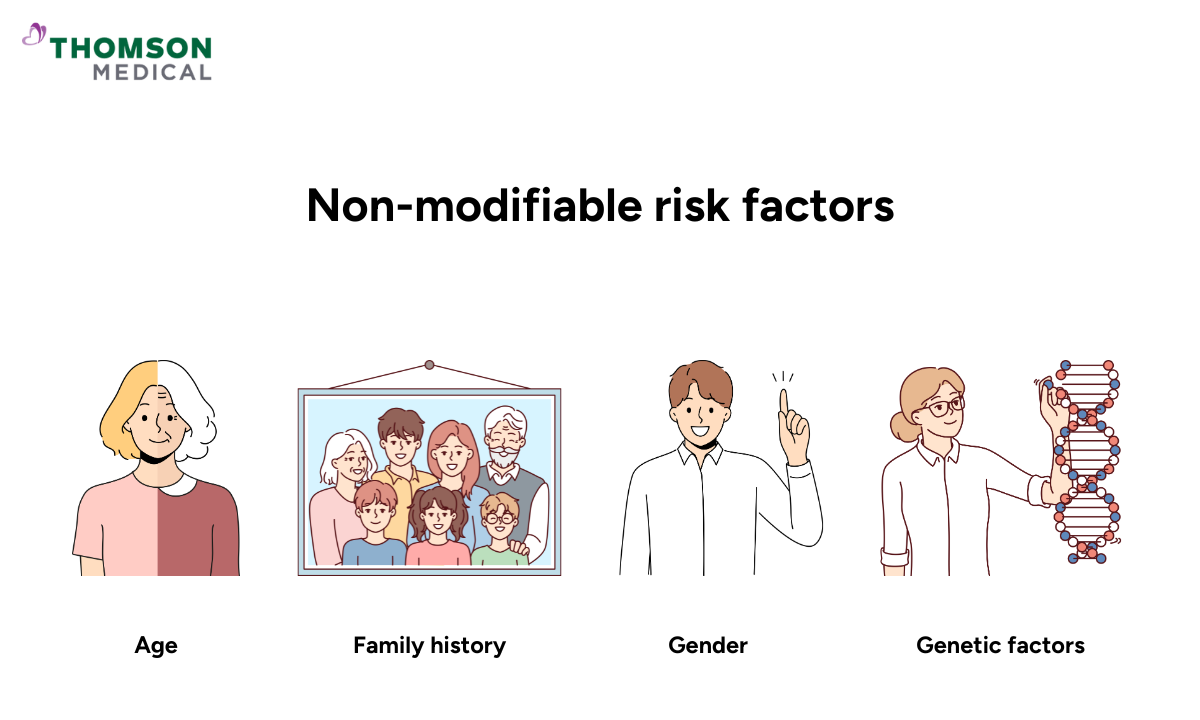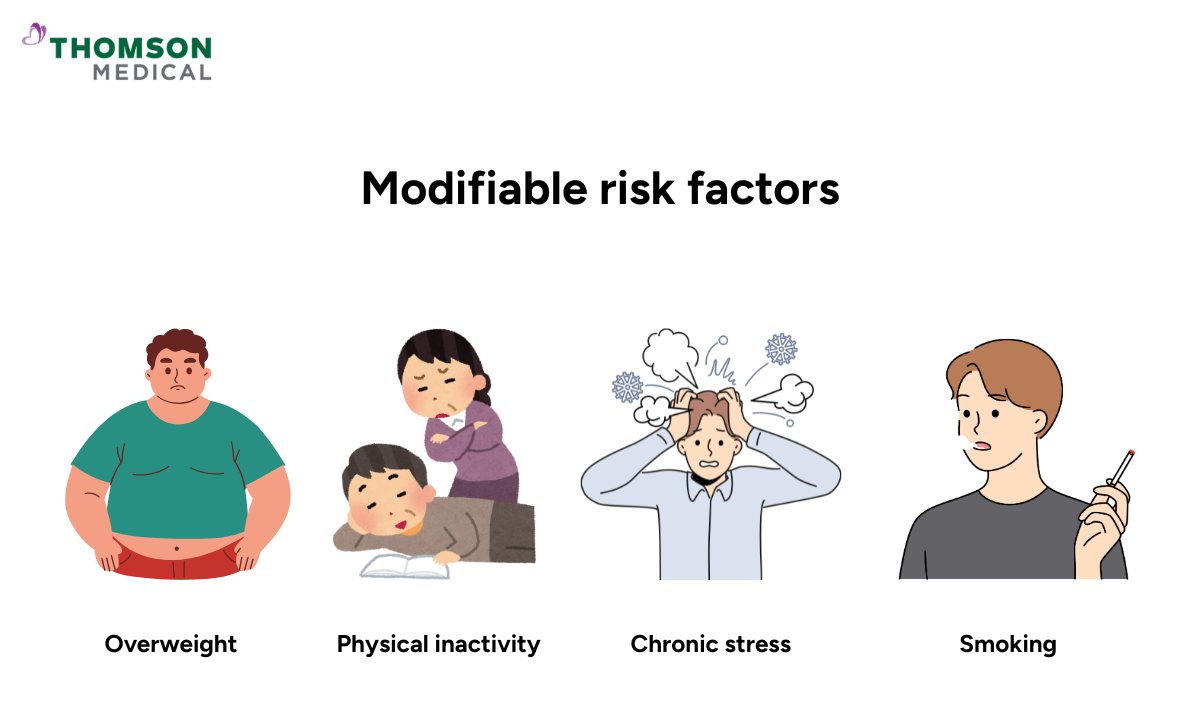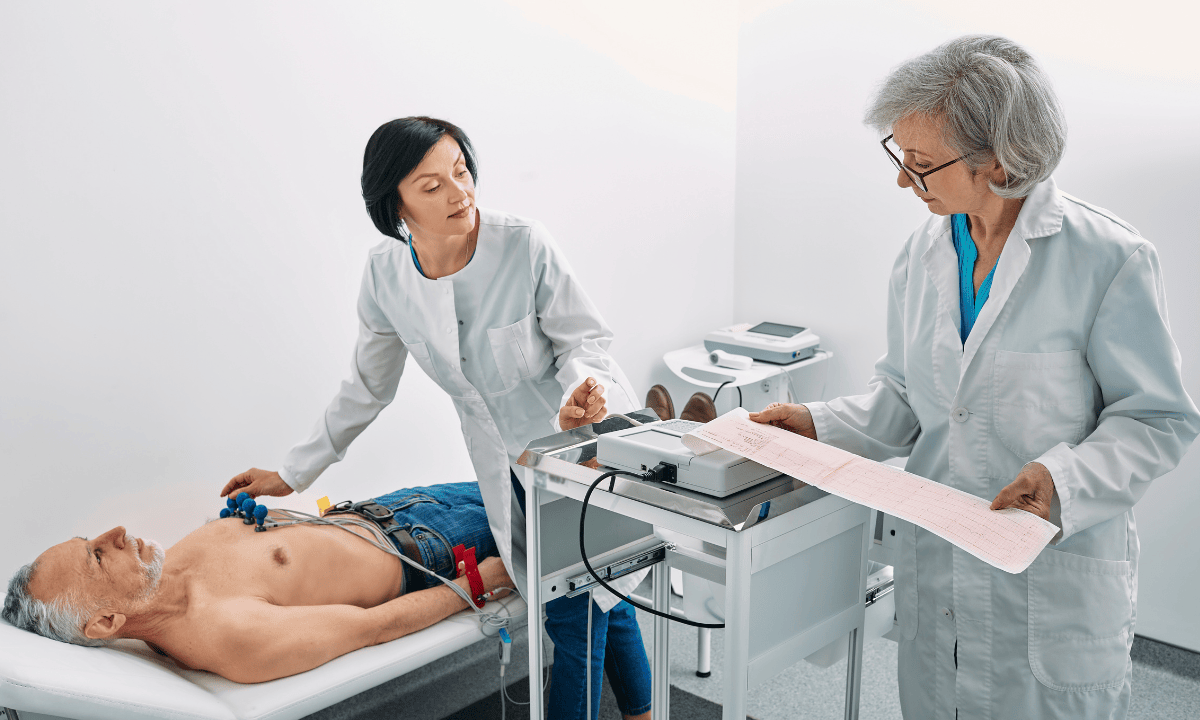What is a heart screening?
A heart screening is a series of medical tests and evaluations that help assess your risk for heart disease, detect early signs of heart problems, and monitor overall heart health. The screening can identify issues such as high blood pressure, irregular heart rhythms (arrhythmia), and blocked arteries (coronary artery disease), all of which can lead to conditions such as heart attacks and strokes.
A routine heart health assessment is recommended for individuals aged 20 to 45 or over who have risk factors for heart disease. This is because symptoms of heart disease may not always be noticeable. In Singapore, heart screenings can be performed at public or private hospitals or at specialist heart clinics.
The importance of heart health screening

Heart health screening allows for early detection of cardiac problems and timely intervention before they become severe. Here are several key reasons why heart tests are important:
Early detection of heart disease risk
Heart health screenings help identify cardiovascular risk factors like high blood pressure, high cholesterol, or diabetes, even before symptoms appear.
Thus, allowing for early intervention and management to prevent more serious cardiovascular conditions, such as coronary artery disease, in the future.
Prevention of heart attacks and strokes
A heart test identifies abnormalities, such as restricted or blocked arteries, heart disease, or heart arrhythmia, which allows preventive measures, such as lifestyle modifications or medications, to minimise the risk of heart attacks and strokes.
Monitoring existing heart conditions
For individuals already diagnosed with heart disease, regular screenings help monitor disease progression, assess the effectiveness of treatment, and make necessary adjustments to care plans.
Identifying modifiable risk factors
Many factors that increase the risk of heart disease are modifiable or can be changed or managed.
Screening helps identify behaviours or conditions, like smoking, poor diet, lack of exercise, or high cholesterol levels that increase cardiovascular disease risk.
Personalised health management
Heart tests allow your healthcare providers to provide personalised recommendations, whether medication, exercise programmes, or dietary changes, to optimise heart health and prevent future cardiovascular events.
Peace of mind
Regular heart screenings provide reassurance for individuals with cardiovascular health concerns.
Even for individuals without cardiovascular risk factors or a family history of heart disease, screening provides a sense of assurance, as they are actively monitoring and safeguarding their cardiovascular health.
Reduces healthcare costs in the long run
By detecting problems early and managing risk factors effectively, screenings can help prevent costly medical emergencies like heart attacks, strokes, or surgeries.
This reduces the need for expensive treatments down the line and promotes long-term heart health.
For further information about heart screening, request an appointment with Thomson Medical. Our healthcare team can provide additional information and support throughout the screening process.
Who should go for a heart screening test?
Generally speaking, everyone can benefit from regular heart screenings because the risk of heart disease increases as you get older. However, some individuals are at greater risk and should be prioritised for testing. Cardiovascular risk factors are generally divided into two categories: non-modifiable and modifiable.
Non-modifiable risk factors

These are factors that cannot be changed, but they can influence the likelihood of developing heart disease, which include:
Age:
The risk of heart conditions increases with age, particularly after 45 for men and 55 for women. However, individuals with risk factors may start screening from the age of 20.
Family history:
Having a family history of heart disease increases your risk of developing the condition.
Gender:
Men are generally at higher risk at a younger age, but the risk for women increases after menopause.
Genetic factors:
Inherited genetic factors can affect cholesterol levels, blood pressure, and overall heart health.
Kidney disease:
Chronic kidney disease (CKD) increases the risk of heart disease because the gradual loss of kidney function means it is unable to filter excess water and salt from the blood, which can lead to high blood pressure and cardiovascular disease.
CKD can also contribute to accelerated atherosclerosis (plaque build-up in the arteries) and other heart complications.
Modifiable risk factors

These are factors that can be changed or managed to reduce the risk of heart disease:
High blood pressure (hypertension)
High cholesterol
Smoking
Being obese or overweight
Physical inactivity
Unhealthy diet
Excessive alcohol consumption
Chronic stress
Other risk factors
These conditions also increase the risk of heart disease, and most of them can be modified to some extent.
Diabetes:
Both type 1 and type 2 diabetes can increase the risk of cardiovascular disease. While type 1 diabetes cannot be modified, type 2 can be managed and even prevented.
This is because it causes glucose (sugar) to build up in the blood. Having too much glucose in the blood for a prolonged period can damage blood vessels and increase the risk of heart attacks.
Inflammatory diseases:
Chronic inflammatory conditions such as rheumatoid arthritis and lupus can increase your risk of developing heart disease. This is because long-term inflammation can damage blood vessels and allow fatty deposits (plaque) to build up more easily, which can lead to heart attacks.
While these diseases cannot usually be cured, controlling inflammation with medication, a healthy diet and regular check-ups can help reduce your risk of heart problems.
What to prepare before the screening?
Preparing for a comprehensive heart health screening is relatively straightforward and doesn't require much preparation. However, you might have to follow specific preparation guidelines based on the tests that are needed. But don't worry; your doctor will explain everything you need to know about the test.
However, in general, this is what you need to prepare before taking the test, which includes:
Wear comfortable clothing, since you may need to remove it from the waist up.
On test day, don't use lotions or oils on your arms or chest, as they can interfere with ECG electrode placement.
Avoid caffeinated beverages (such as coffee, tea, and energy drinks) and smoking for at least 24 hours before the test, since these can affect your heart rate and blood pressure.
If blood tests are necessary, you may need to fast. This means not eating or drinking anything except plain water for at least 6–8 hours before your scheduled appointment.
If you are doing an exercise stress test, avoid eating a heavy meal before your appointment.
Additionally, remember to inform your healthcare provider of all the medications you are currently taking, particularly those that affect your heart rate. They can advise you on whether you should stop taking these medications temporarily.
You should also inform your healthcare provider if you have any medical devices (such as a pacemaker or defibrillator) or if you are pregnant. Taking these simple steps will help ensure your test results are as accurate as possible.
Available heart screening packages in Singapore
In Singapore, various heart screening packages are available to assess cardiovascular risk and detect early signs of heart disease. Although the specific content of these packages may vary depending on where the tests are carried out, they typically include one or more of the following tests.
Electrocardiogram (ECG):
An ECG test is used to record the electrical activity of your heart. It helps identify heart arrhythmia, signs of heart attack, or other heart conditions that may not yet show symptoms.
Echocardiogram:
An echocardiogram is an ultrasound of the heart that provides detailed images of the heart's structure and function. It helps detect issues such as valve problems, heart enlargement, or fluid buildup around the heart.
12-lead electrocardiogram (ECG):
A 12-lead electrocardiogram (ECG) is a heart screening test that uses 10 strategically placed electrodes to capture the heart’s electrical activity from 12 distinct angles.
It offers an in-depth primer on cardiac function and is commonly used to detect and monitor various heart conditions, such as an irregular heartbeat.
Treadmill electrocardiography (ECG):
A treadmill ECG test, also known as an exercise stress test, assesses your heart function by checking how well your heart responds to physical stress.
During the test, electrodes are placed around your chest and limbs to measure your heart’s electrical activity, heart rate, and blood pressure while you walk on an exercise treadmill.
CT Coronary Artery Calcium (CAC) scoring:
A CT Coronary Artery Calcium (CAC) scan measures the amount of calcium buildup in the coronary arteries. This test helps determine the risk of atherosclerosis (build-up of plaque in the arteries), which is a sign of heart disease.
CT Coronary Angiogram (CTCA):
A CT coronary angiogram (CTCA) is a non-invasive imaging technique that provides detailed images of the blood vessels in the heart.
It helps to identify blockages or narrowing of the arteries, which can increase the risk of a heart attack. It is recommended for individuals at a higher risk of, or with symptoms suggestive of, coronary artery disease.

Other heart screening tests
Depending on individual risk factors and health history, additional screenings include:
Blood tests:
Blood tests are used to check cholesterol, blood sugar, and other relevant markers of heart disease risk.
Urine analysis:
Urine analysis assesses kidney function and helps identify other symptoms of heart disease.
Carotid ultrasound:
Carotid ultrasounds evaluate the carotid arteries in the neck to assess the risk of stroke by looking for narrowing or plaque build-up.
Ankle-brachial index (ABI):
The ABI index is used to measure the ratio of blood pressure in the ankle and arm to check for peripheral artery disease.
How much does a heart screening cost?
Packages for heart screenings are available at public and private hospitals, as well as at specialist heart clinics in Singapore. The cost can vary depending on the tests included and the facility chosen.
Generally, heart tests start at SGD 380 and can cost up to SGD 2,000 at a private clinic. However, the cost may be lower if the procedure is performed in a public hospital.
Unfortunately, Medisave cannot be used to pay for routine heart health screenings unless they are part of an approved Chronic Disease Management Programme (CDMP) or specific screening programme. If you have private insurance, check with your provider to see if your policy covers heart tests.
To find out more about fees and payment options, request an appointment with our specialists at Thomson Medical today. For further information about CDMP, please refer to the website of Singapore's Ministry of Health (MOH).
FAQ
How to get a full heart check-up?
To get a full heart screening test, you can consult either a heart doctor (cardiologist) or a GP. They will recommend the necessary tests based on your risk factors and health history.
This screening usually involves various assessments, such as blood tests to check cholesterol and blood sugar levels, an ECG, and a physical examination. If necessary, you may also be given a stress test or CT scan.
Can my GP check my heart?
Yes, your GP can assess your heart health by carrying out a basic examination and checking your blood pressure.
They may also recommend tests such as an ECG or blood tests to evaluate your cholesterol and blood sugar levels. If necessary, they can refer you to a cardiologist for more specialised tests.
How often should I go for heart screening?
The frequency of heart screenings depends on your age, risk factors, and overall health. Typically, adults should have their heart health checked every 1-2 years, but those at higher risk (e.g., with a family history, hypertension, or diabetes) may need more frequent screenings.
At what age should I get my heart checked?
If you are at risk of cardiovascular disease, it is recommended that you undergo routine heart health screenings from the age of 20. This is because risk factors, such as high blood pressure, high cholesterol, and diabetes, can develop silently, so early detection is important for prevention.
What are the warning signs of clogged arteries?
Clogged arteries, which are caused by the buildup of plaque (atherosclerosis), can restrict blood flow and lead to serious health problems, such as heart attacks and strokes. The symptoms depend on which arteries are affected, and many people may not notice any signs until the blockage becomes severe or a major event occurs.
Here are some common warning signs of clogged heart arteries:
- Chest pain or discomfort (angina)
- Shortness of breath
- Fatigue
- Heart palpitations or an irregular heartbeat
- Dizziness or light-headedness
- Cold sweats
- Nausea or indigestion
Is my heart ok if the ECG is normal?
A normal ECG (electrocardiogram) is a positive indication that your heart muscle and electrical activity are functioning within normal limits. However, a normal ECG does not guarantee that your heart is completely healthy or free from heart problems.
If you experience symptoms such as chest pain, shortness of breath or unexplained fatigue, or if you have significant risk factors for heart disease, your doctor may recommend further tests, even if your ECG is normal.
This information is intended as general guidance only and should not be considered as medical advice. For personalised heart screening recommendations based on your medical conditions, request an appointment with Thomson Medical.
For more information, contact us:
Thomson Specialists Paragon (Health Screening)
- Mon - Fri: 8.30am - 5.30pm
- Sat: 8.30am - 12.30pm
Call: 6735 0300
See Health Screening Packages
Notice:
The range of services and tests may vary. Please contact us directly to enquire about the current availability.
Book Health Screening